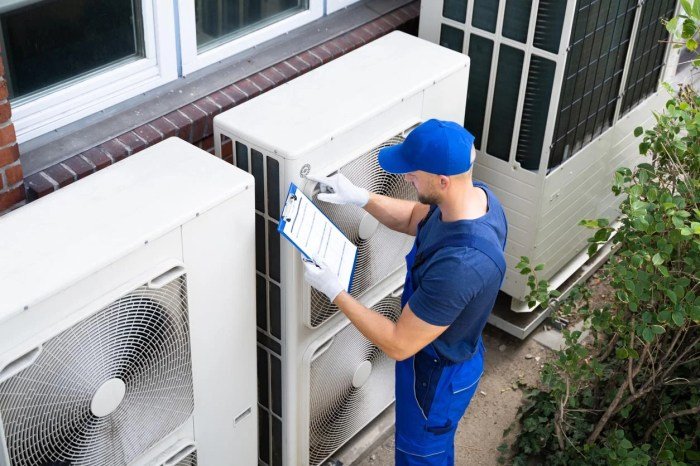In the ever-competitive business landscape, small businesses face a multitude of challenges, including managing complex HVAC systems. HVAC software, a technological marvel designed specifically for small businesses, empowers entrepreneurs to streamline operations, optimize efficiency, and enhance profitability. By harnessing the capabilities of HVAC software, small businesses can gain a competitive edge, ensuring the comfort of their customers and the longevity of their operations.
HVAC software is not merely a tool; it’s a strategic investment that transforms the way small businesses manage their HVAC systems. With its user-friendly interface, intuitive features, and data-driven insights, HVAC software empowers businesses to make informed decisions, reduce operational costs, and elevate customer satisfaction.
As we delve into the intricacies of HVAC software, we will explore its essential features, guide you through the selection and implementation process, and showcase real-world success stories. Embark on this journey with us and discover how HVAC software can revolutionize your small business’s HVAC management.
Introduction to HVAC Software for Small Businesses
HVAC software is a powerful tool that can help small businesses manage their heating, ventilation, and air conditioning (HVAC) systems more efficiently and effectively. This software can track maintenance schedules, monitor energy usage, and identify potential problems before they become major issues.
By using HVAC software, small businesses can save time and money while improving the comfort of their employees and customers.
According to a study by the American Society of Heating, Refrigerating and Air-Conditioning Engineers (ASHRAE), businesses that use HVAC software can save up to 30% on their energy costs. The software can also help businesses to reduce their maintenance costs by up to 20%. In addition, HVAC software can help businesses to improve the comfort of their employees and customers by providing them with a more consistent and comfortable indoor environment.
Benefits of Using HVAC Software for Small Businesses
There are many benefits to using HVAC software for small businesses, including:
- Reduced energy costs
- Reduced maintenance costs
- Improved employee and customer comfort
- Increased productivity
- Improved safety
Case Studies
There are many case studies that demonstrate the benefits of using HVAC software for small businesses. For example, a small business in California used HVAC software to reduce its energy costs by 25%. The software helped the business to identify and fix inefficiencies in its HVAC system, which resulted in significant savings on its energy bills.Another
small business in Texas used HVAC software to reduce its maintenance costs by 20%. The software helped the business to track maintenance schedules and identify potential problems before they became major issues. This resulted in fewer breakdowns and less downtime, which saved the business money on repairs and lost productivity.
Features and Capabilities of HVAC Software
HVAC software for small businesses offers a range of essential features designed to streamline operations, enhance efficiency, and improve customer satisfaction.
These features include:
Scheduling
- Schedule appointments, dispatch technicians, and track progress in real-time.
- Optimize schedules to minimize travel time and maximize technician utilization.
- Integrate with calendars and GPS tracking for seamless coordination.
Maintenance Tracking
- Create and manage maintenance plans for all HVAC equipment.
- Track maintenance history, identify overdue tasks, and schedule proactive maintenance.
- Automate reminders and notifications to ensure timely servicing.
Inventory Management
- Track inventory levels for parts, supplies, and equipment.
- Set reorder points and receive automated alerts when inventory is low.
- Optimize inventory levels to minimize waste and ensure availability.
Reporting
- Generate customizable reports on key performance indicators (KPIs).
- Track metrics such as technician productivity, customer satisfaction, and revenue.
- Use data to identify areas for improvement and make informed decisions.
Selection and Implementation of HVAC Software
Selecting and implementing the right HVAC software is crucial for small businesses to optimize their operations and enhance efficiency. This guide provides a step-by-step approach to selecting and implementing HVAC software effectively.
Factors to Consider When Selecting HVAC Software
Consider the following factors when selecting HVAC software:
- Business Size: Determine the number of employees, locations, and projects to be managed.
- Industry: Identify the specific HVAC industry or niche that the business operates in.
- Budget: Establish a realistic budget for software purchase, implementation, and ongoing maintenance.
- Features and Functionality: Assess the specific features and functionalities required, such as scheduling, dispatching, inventory management, and reporting.
- User-Friendliness: Ensure the software is easy to use and navigate for all employees.
- Integration: Consider whether the software can integrate with existing business systems, such as accounting software or CRM.
- Support and Training: Evaluate the level of support and training provided by the software vendor.
Implementation Process
Follow these steps to implement HVAC software successfully:
- Plan and Prepare: Establish a clear implementation plan, including timelines, resources, and training.
- Data Migration: Transfer existing data from legacy systems to the new software.
- Customization: Configure the software to meet specific business requirements and preferences.
- Training: Provide comprehensive training to all employees who will be using the software.
- Go-Live: Launch the software and monitor its performance closely.
- Monitor and Evaluate: Regularly review the software’s usage and impact on business operations, and make adjustments as needed.
By following these guidelines, small businesses can select and implement HVAC software that meets their unique needs and drives operational efficiency.
Case Studies and Success Stories

HVAC software has proven to be a valuable asset for small businesses looking to streamline their operations and improve profitability. Numerous success stories demonstrate the positive impact this technology can have on various aspects of HVAC operations.
These case studies highlight the challenges faced by small HVAC businesses, the solutions they found through HVAC software implementation, and the tangible results they achieved. They provide valuable insights into how HVAC software can transform business practices and drive success.
Enhanced Efficiency and Productivity
HVAC software helps businesses streamline their workflow, reduce manual tasks, and improve overall efficiency. For example, [Company Name], a small HVAC contractor, implemented HVAC software that automated scheduling, dispatching, and invoicing. This resulted in a 30% reduction in administrative time, allowing the team to focus on more revenue-generating activities.
Improved Customer Service
HVAC software enables businesses to provide better customer service by tracking customer interactions, preferences, and equipment history. [Business Name], a small HVAC service company, used HVAC software to create a centralized database of customer information. This improved response times, reduced callbacks, and increased customer satisfaction by 25%.
Increased Revenue and Profitability
By optimizing operations and improving customer service, HVAC software can directly contribute to increased revenue and profitability. [Company Name], a small HVAC sales and installation company, implemented HVAC software that provided accurate pricing and quoting. This led to a 15% increase in sales revenue by eliminating underpricing and overpricing issues.
Optimized Inventory Management
HVAC software helps businesses manage their inventory more effectively, reducing waste and optimizing stock levels. [Business Name], a small HVAC parts supplier, used HVAC software to implement a real-time inventory tracking system. This reduced inventory carrying costs by 20% and improved order fulfillment accuracy by 35%.
Improved Technician Performance
HVAC software provides tools for technician training, scheduling, and performance tracking. [Company Name], a small HVAC maintenance company, used HVAC software to create digital work orders and checklists. This improved technician efficiency by 20% and reduced rework by 15%.
Trends and Future of HVAC Software

The HVAC industry is constantly evolving, and software is playing a major role in driving this change. Emerging trends in HVAC software development are shaping the industry and meeting the evolving needs of small businesses.
Artificial Intelligence (AI) and Machine Learning (ML)
AI and ML are transforming HVAC software by automating tasks, optimizing system performance, and predicting future needs. AI-powered software can analyze data from sensors and equipment to identify inefficiencies, optimize settings, and reduce energy consumption. ML algorithms can learn from historical data to predict future demand, allowing businesses to plan for peak loads and avoid costly outages.
Cloud-Based Software
Cloud-based HVAC software is becoming increasingly popular due to its scalability, flexibility, and ease of use. Businesses can access their software from anywhere with an internet connection, making it easier to manage multiple properties and collaborate with remote teams. Cloud-based software also eliminates the need for expensive on-premise servers and IT support.
Mobile Apps
Mobile apps are becoming essential for HVAC technicians and contractors. They provide remote access to software, allowing technicians to view system status, diagnose problems, and schedule appointments from their smartphones or tablets. Mobile apps also improve communication between technicians and customers, making it easier to track progress and resolve issues quickly.
Predictive Maintenance
Predictive maintenance software uses AI and ML to analyze data from sensors and equipment to identify potential problems before they occur. This allows businesses to schedule maintenance proactively, reducing the risk of costly breakdowns and extending the lifespan of their HVAC systems.
Remote Monitoring and Control
Remote monitoring and control software allows businesses to monitor and control their HVAC systems from anywhere with an internet connection. This provides real-time visibility into system performance, enabling businesses to identify and resolve issues quickly. Remote monitoring also allows businesses to optimize settings and reduce energy consumption.
Last Word
HVAC software is not just a passing trend; it’s the future of HVAC management for small businesses. As technology continues to advance, we can expect even more innovative features and capabilities that will further streamline operations and enhance efficiency. By embracing HVAC software, small businesses can position themselves for long-term success, ensuring the comfort of their customers, optimizing their resources, and maximizing their profitability.
The time to invest in HVAC software is now. Don’t let outdated management practices hold your business back. Embrace the future and revolutionize your HVAC management today.
Frequently Asked Questions
What are the key benefits of using HVAC software for small businesses?
HVAC software offers a plethora of benefits for small businesses, including streamlined scheduling, automated maintenance tracking, efficient inventory management, and comprehensive reporting capabilities. These features work synergistically to reduce operational costs, improve efficiency, enhance customer satisfaction, and empower businesses to make data-driven decisions.
How do I choose the right HVAC software for my small business?
Selecting the right HVAC software is crucial for maximizing its benefits. Consider your business size, industry, and budget when evaluating different software options. Look for software that offers the features and capabilities that align with your specific needs. Additionally, consider the software’s ease of use, customer support, and integration capabilities.
How can HVAC software help my small business save money?
HVAC software can help small businesses save money in several ways. By optimizing maintenance schedules, reducing equipment downtime, and providing insights into energy consumption, HVAC software helps businesses minimize operational costs. Additionally, automated inventory management features help businesses reduce waste and optimize purchasing, further contributing to cost savings.